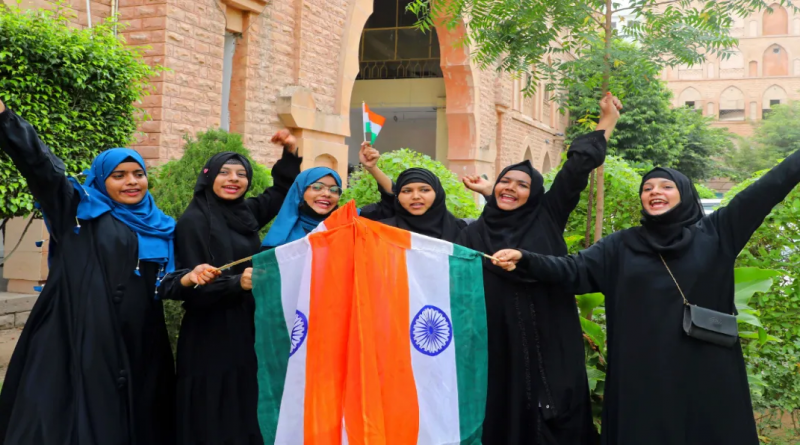Indian Muslim Women Enjoy Greater Rights than Those in Islamist States
Constitutional framework in India provides Muslim women with avenues for empowerment and justice that are often unavailable in Islamist state
In the contemporary discourse on women’s rights within Muslim-majority societies, a significant contrast emerges between the experiences of Muslim women in India and those in several Islamist states such as Pakistan, Afghanistan, Iran, and others.
While challenges persist in India, the legal framework and constitutional guarantees provide Indian Muslim women with avenues for empowerment and justice that are often inaccessible to their counterparts in more theocratic regimes.
Legal Protections and Constitutional Guarantees
India’s secular constitution enshrines fundamental rights that apply uniformly to all citizens, irrespective of religion. Articles 14 (Right to Equality), 15 (Prohibition of Discrimination), and 21 (Protection of Life and Personal Liberty) form the bedrock of these protections.
For instance, the landmark judgment in the Shayara Bano case led the Supreme Court to declare the practice of instant triple talaq unconstitutional, recognizing it as a violation of the constitutional guarantee of equality. Indeed Quran does not endorse instant triple talaq, which was unIslamically followed in India.
Furthermore, the Muslim Women (Protection of Rights on Marriage) Act, 2019, criminalizes the practice of instant triple talaq, providing Muslim women with legal recourse and protection against arbitrary divorce. This legislative action underscores India’s commitment to upholding the rights of Muslim women within its constitutional framework.
In contrast, many Islamist states impose legal systems that often restrict women’s rights. In Afghanistan, under Taliban rule, women face severe limitations on their mobility, education, and employment. The Taliban’s return to power has led to the re-imposition of strict interpretations of Sharia law based on strict Hanafi-Deobandi interpretation of Islam, effectively erasing many of the gains women had made in the preceding two decades.
Access to Education and Employment
Education is a fundamental right in India, and Muslim women have access to educational institutions across the country.
Initiatives like the Beti Bachao Beti Padhao scheme aim to promote the education of girls, including those from minority communities. Additionally, various state governments have implemented programs to provide scholarships and financial assistance to Muslim women pursuing higher education.
Employment opportunities for Muslim women in India, though varied, are supported by affirmative action policies and reservations in public sector jobs. The Indian government’s focus on skill development and entrepreneurship has also opened avenues for Muslim women to engage in the workforce and contribute economically.
In stark contrast, in countries like Iran and Afghanistan, women face systemic barriers to education and employment.
In Iran, despite a high literacy rate among women, many fields of study and professions remain closed to them due to restrictive laws and societal norms. Similarly, in Afghanistan, the Taliban’s policies have led to the closure of girls’ schools and the prohibition of women from working in most sectors, severely limiting their opportunities for personal and professional growth.
Autonomy in Personal Matters
The Indian legal system recognizes the autonomy of Muslim women in personal matters, including marriage and divorce.
The Supreme Court’s intervention in the Shah Bano case led to the enactment of the Muslim Women (Protection of Rights on Divorce) Act, 1986, which ensures maintenance rights for divorced Muslim women during and after the iddat period.
Moreover, recent judicial decisions, such as the Telangana High Court’s ruling that khula (divorce initiated by the wife) must be processed through the courts rather than religious bodies, reinforce the principle of legal oversight in personal matters. This ensures that Muslim women have access to legal remedies and are not subject to arbitrary decisions by non-judicial authorities.
In contrast, in countries like Pakistan, while Islamic law provides for women’s rights in marriage and divorce, the application of these laws is often inconsistent and influenced by patriarchal interpretations.
Women’s access to justice in personal matters can be hindered by societal pressures and the dominance of informal religious councils over formal judicial systems.
Freedom of Expression and Political Participation
India’s democratic framework guarantees freedom of speech and political participation to all its citizens. Muslim women in India actively engage in political discourse, participate in elections, and advocate for their rights through various platforms.
Organizations like the Bharatiya Muslim Mahila Andolan (BMMA) work towards reforming personal laws and promoting gender justice within the Muslim community.
The Indian media also plays a crucial role in highlighting issues related to Muslim women, providing them with a platform to voice their concerns and aspirations. This democratic space enables Muslim women to challenge discriminatory practices and seek reforms that align with their rights and dignity.
In contrast, in many Islamist states, freedom of expression is curtailed, and political participation is often limited for women.
In countries like Iran and Afghanistan, women face repression for expressing dissent or advocating for their rights. The lack of democratic institutions and the suppression of civil liberties create an environment where women’s voices are marginalized, and their participation in public life is restricted.
Looking Forward
While no society is free from challenges, the legal and constitutional framework in India provides Muslim women with avenues for empowerment and justice that are often unavailable in Islamist states. The Indian model, with its secular constitution and commitment to human rights, offers a more inclusive environment for Muslim women to exercise their rights and contribute to society.
In contrast, the experiences of Muslim women in Islamist states highlight the importance of constitutional guarantees and legal protections in ensuring gender equality and personal freedom.
Disclaimer: Views expressed by writers in this section are their own and do not reflect Milli Chronicle’s point-of-view.



